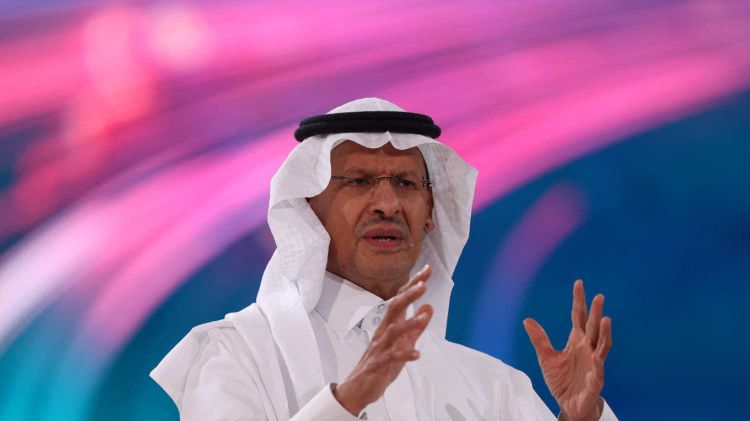Saudi Arabia's oil policy hits fears of global economic slowdown

Saudi Arabia may face challenges in pursuing its major projects due to the recent 40 percent drop in oil prices. This decline in value may obstruct the country's financial plans and affect the implementation of their ambitious schemes.

On 25th October in the Saudi capital of Riyadh, Abdulaziz bin Salman, Saudi Arabia's Minister of Energy, made an appearance at the annual Future Investment Initiative conference.
Blog posted: 12 June 2023 at 6:33 pm BST | Last updated: 2 days and 15 hours ago
On Monday, there was a renewed decrease in the cost of oil. This highlights the difficulty Saudi Arabia is facing in its attempt to support oil prices because of increased production from Russia, beyond what was initially expected, and worries about the state of the worldwide economy.
At a business conference in Riyadh that focused on Arab-China relations, Saudi Arabia's Energy Minister, Prince Abdulaziz bin Salman, stated on Sunday that their efforts were directed towards countering the impact of unpredictability and emotions.
On Monday morning EST, the global gauge of oil prices, Brent crude, experienced a decrease of 2.77 percent to reach $72.72 per barrel. The drop in price was linked to concerns regarding a potential economic downturn occurring in both the United States and China, as the latter nation grapples with a lackluster post-Covid economic recovery.
Despite Saudi Arabia's unexpected move in June to decrease production by one million barrels per day in an attempt to increase prices, the drop still occurred. This action was referred to as a "Saudi lollipop" by Abdulaziz.
Although Saudi Arabia has cut the price of oil, there are still people who bet against it. Goldman Sachs has lowered their forecast for Brent oil prices in December for the third time in the past six months. They now predict the price will be around $86 per barrel instead of $95 per barrel. It's worth noting that Goldman Sachs has been more optimistic about oil prices in the past.
Get Updated With MEE's Newsletters
Abdulaziz is known for his strong stance against traders who are gambling on the fall in oil prices. He cautioned these speculators that they will suffer greatly if they underestimate his commitment to keeping prices stable. In June, he also gave them a word of advice to be careful before the Opec+ meeting.

Saudi Arabia has been leading the charge in urging Opec+, which is a consortium of oil-producing nations headed by Russia and Saudi Arabia, to slash production. Despite two reductions in production within the past eight months, oil prices have plummeted by 40 percent, decreasing from a height of $125 per barrel in May of 2022 to roughly $75.
Saudi Arabia has taken advantage of the recent surplus of income from oil to move forward with large-scale projects aimed at broadening the country's economy beyond relying on non-renewable energy sources.
The IMF shared that Saudi Arabia requires a price per barrel of oil surpassing $80 to maintain its budget and complete initiatives, such as the $500 billion mega Neom city and a fresh airline project. Some experts speculate that Abdulaziz might have to increase prices due to pressure from his half-brother, Crown Prince Mohammed bin Salman.
"Putin Meets With Crown Prince"
The decrease in cost is happening at the same time as The International Energy Agency cautions that lowering production levels led by Saudi Arabia may cause a decline in the worldwide oil surplus, which could result in an upsurge in inflation. However, Saudi Arabia is navigating a precarious balance. If they reduce production too much, it could lead to a rise in cost when the international economy is fragile, resulting in a negative trend in demand.
In June, Saudi Arabia reduced its total oil production by 10 percent which resulted in the loss of their market share. However, the decrease in oil prices has prevented them from compensating for the financial deficit. Moreover, the rising oil production in Russia has further challenged Saudi Arabia's attempts to keep supply under control.
The newly established airline in Saudi Arabia is poised to disrupt the aviation industry in the Gulf region.
Russia has started selling crude oil at a reduced rate due to sanctions imposed by Western countries during the Ukraine war. In order to make up for the lower prices, Moscow is increasing the volume it sells. Based on data gathered by Bloomberg, Russia's crude oil exports almost reached a new record in the span of four weeks until June 4.
Recently, a phone conversation took place between the Russian leader Vladimir Putin and the Saudi Crown Prince Mohammed bin Salman, during which they showed appreciation for their successful cooperation in Opec+. There have been rumors circulating that there were disagreements between Riyadh and Moscow regarding oil production.
The Kremlin announced that the two heads of state had a thorough conversation on ways to sustain stability in the global energy sector.
The two parties expressed appreciation for their collaboration under the Opec+ umbrella, which enabled them to implement prompt and efficient measures in maintaining equilibrium between oil supply and demand. This was mentioned in an announcement from the Kremlin.





























































